Funeral costs have gone through the roof. For those who are not careful, unscrupulous companies in the funeral industry may try to make a fat profit off your grief.
Between the costs of embalming, the burial plot, burial vault, headstone, and the funeral service itself (among many other ancillary services), average funeral costs in the U.S. now exceed $10,000, according to the National Funeral Directors Association.
As you may have noticed, we omitted one big factor: casket prices. The cost of a casket for burial is one of the biggest drivers of total expenses for traditional funerals. This guide will explore four separate questions:
- What is a casket (or coffin)?
- What types of caskets are there?
- How much is a casket?
- Where to buy caskets?
Let’s dive in.
Choose kindness.
You never know what battles people may be fighting.
What Is A Casket?
A casket is a box or container used to hold the body of someone who has died.
Caskets come in various shapes, sizes, and materials (generally wood, metal, fiberglass, or plastic).
Caskets vary significantly in design, with more affordable caskets being very simple. In contrast, high-end caskets can be elaborately designed with expensive ornamentation that can cost tens of thousands of dollars.
The type you choose will depend on your taste, budget, and, potentially, your religious beliefs.
The History & Significance Of Caskets
Before caskets became the norm, bodies were not buried but instead placed in a burial chamber.
When burying deceased individuals became the norm, caskets replaced burial chambers.
The first coffins were made from stone, but the most common material later became wood. Metal caskets followed, and steel was widely used for military purposes around World War I due to its durability and strength.
Fiberglass and plastic are two of the newest materials used in casket construction; however, they are still not mainstream, and you likely won’t find one at your local funeral home.
What Is The Difference Between a Coffin And a Casket?
Many people use the words “casket” and “coffin” interchangeably. However, they’re not the same — here’s the difference between a coffin vs casket:
A coffin is a box that holds a dead body: typically a simple, unpainted wooded box.
Caskets are essentially “fancy” coffins. Caskets are made of sturdier materials that stand up to weather and time. They typically also have ornate decorations.
Caskets and coffins perform the same essential function; the key differences between them are design and cost.
Types of Caskets
Traditionally, there have been three main types of caskets: solid wood (e.g., pine caskets), metal (e.g., copper caskets), and cardboard. However, these days, funeral providers are also making caskets out of biodegradable materials, such as bamboo, to make caskets more environmentally friendly.
Let’s go through each type of casket.
Wood Caskets
Wooden caskets are usually made from hardwood. This material has been used for thousands of years because it’s long-lasting and very sturdy.
The most common types of woods used in creating these caskets are oak, maple, cherry, mahogany, ash tree, walnut, and birch. These materials have beautiful grains on the outside, making them appealing to people who want a more natural-looking casket than one made from metal or plastic. Wood is also easily carved, so high-end caskets with intricate designs are often made of wood.
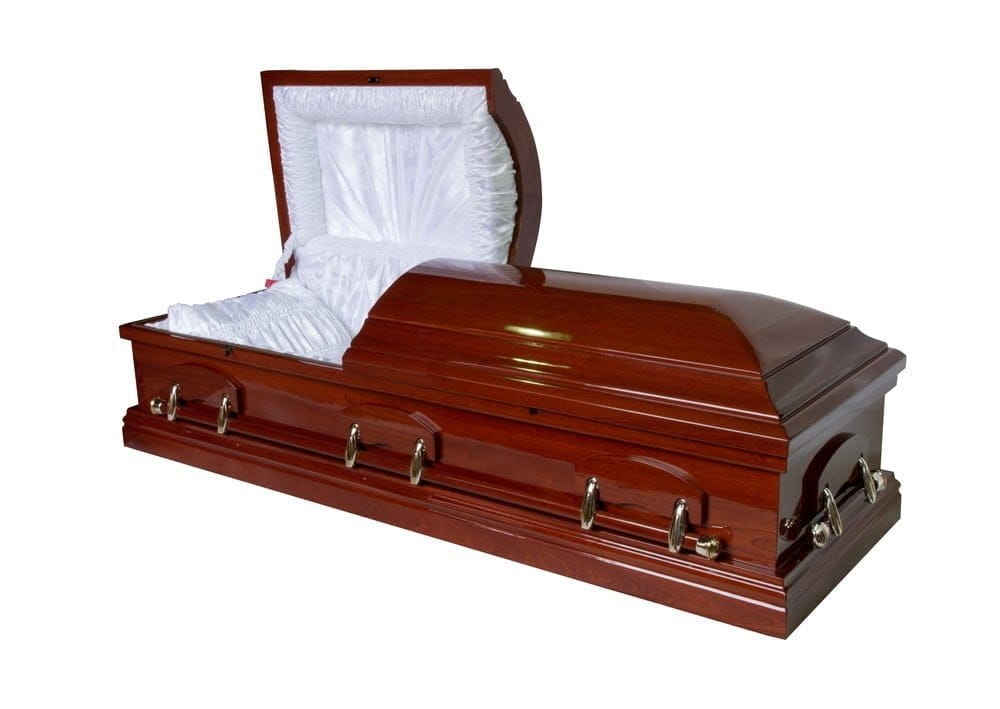
Metal Caskets
Metal caskets are made from metals such as steel, aluminum, copper, and bronze. They have been around since the mid-19th century when people began making burial vaults to ensure that bodies were never exposed during a funeral service or another memorial event.
Metal caskets have recently become popular as they offer strength and durability without the cost of expensive materials such as hardwood.
Metal caskets provide enough support to avoid collapse under pressure and are surprisingly lightweight.
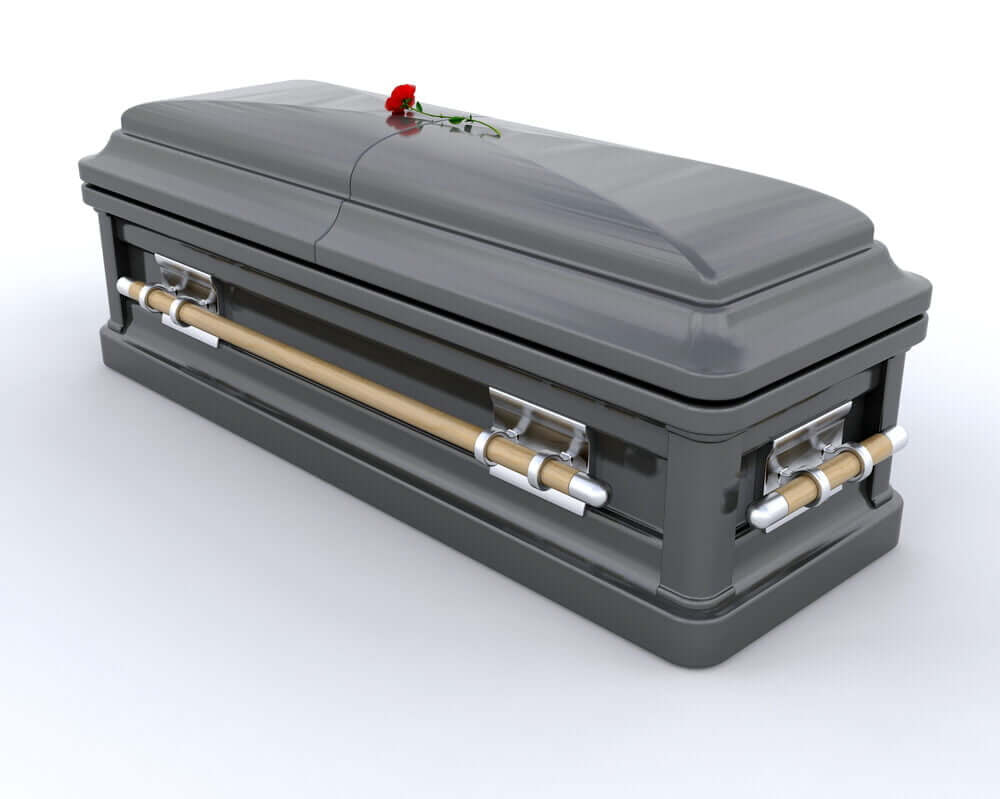
Green Caskets (Biodegradable)
If choosing an environmentally friendly option is important to you, consider purchasing a casket made of natural, biodegradable materials that decompose over time.
These “green” caskets are made of natural materials such as bamboo, wicker, or cotton. They’re excellent for eco-friendly people and for those with allergies to certain types of wood, like oak, which can contain chemicals that cause allergic reactions.
It’s said that these coffins align your soul with nature while also returning your body to the earth. These coffins also lack toxic chemicals, such as formaldehyde, often found in traditional caskets made from metal or cardboard.
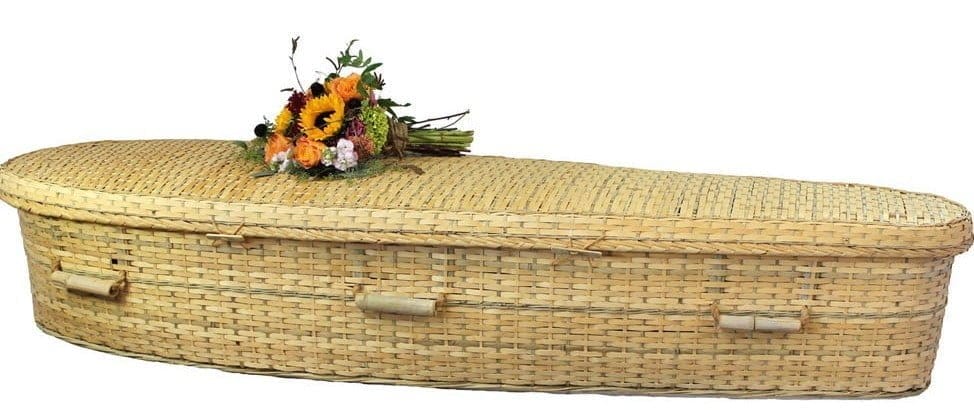
Alternative Containers
Finally, the cheapest option (although one with a wide price range) is a cardboard-covered casket. Cardboard casket prices range from $250 to $4,000.
These caskets are made of corrugated cardboard and customized with anything from flowers to photos, artwork, or beads. They have been popular recently because of their low cost.
If you want to lower your total funeral cost and avoid the high prices of funeral home caskets, biodegradable caskets made from an outer cardboard shell may be the best option.
Cremation Caskets
Finally, what about cremation? Many families ultimately decide that cremation is the only way to “save” on funeral costs.
A cremation casket is a container that holds the body before it’s cremated. It can be made of wood, metal, or cardboard and is usually designed to look similar to traditional burial caskets, with handles, hinges, and sometimes even an exterior finish.
Cremation casket costs vary, but once again, funeral home casket prices will be significantly higher than the alternatives, which we will explore below.
Check Out: The Cons of Prepaying for Your Funeral
Check Out: The cost of headstones: A comprehensive guide
Choose kindness.
You never know what battles people may be fighting.
How Much Does A Casket Cost?
The biggest determinants of casket prices are (1) the material used to construct the casket and (2) where you purchase your casket (i.e., whether from a funeral home or an online provider).
The Cost Of A Wooden Casket
Wooden coffins are considered classic choices because they have been around for years. Many people are familiar with their appearance and might even prefer them over other items.
Based on our survey of 32 casket vendors:
Wood casket prices range between $950 to a whopping $7,900. The average cost of a wood casket, however, is a more reasonable $1,600.
If you are on a tight budget, you can opt for a wooden coffin. Coffins are plain-looking and made from inexpensive materials, making them far less expensive than caskets.
Remember that different kinds of wood also affect prices. Oak is generally the most expensive wood because of its durability, while walnut and cherry are generally more affordable.
Maple and mahogany may cost slightly more than other woods because of their appearance, but they can also last longer with proper care. If you are looking for an inexpensive option, consider the pine box casket.
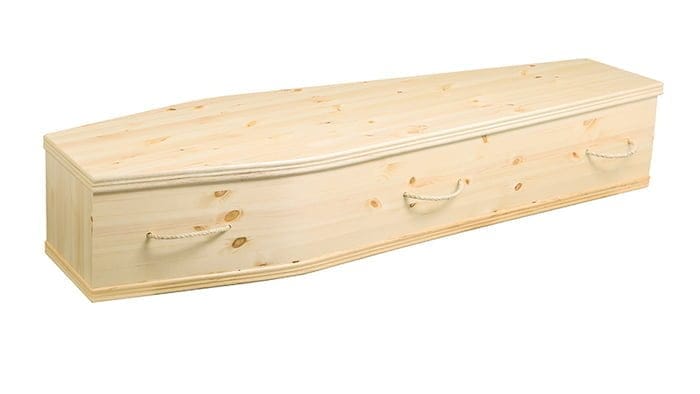
How Much Does A Metal Casket Cost?
Metal caskets are a more modern type of coffin, and they can cost anywhere from $1,000 to $5,000, depending on the brand and style.
They tend to be pricier than wooden coffins because metal is an expensive material that requires special equipment for processing etc. Metal caskets are often called “high-end” items because they come in various stylish designs and finishes.
When choosing this type of coffin, many look for unique features such as built-in speakers so loved ones can enjoy music during memorials/funerals, LED lighting perfect for nighttime funerals, etc.
Some other things worth considering include whether you want handles (many cheap caskets don’t have them), ventilation systems (to prevent molds from growing on your body), or additional add-ons like pillows, etc.
Cost also plays a factor in choosing the right metal for your casket. Bronze is generally the most expensive, but with proper care, it can last for decades.
Stainless steel and copper are more affordable options, although they are still very durable.
Clear Caskets
A clear casket with the body on display is becoming increasingly popular for those looking for a unique and meaningful way to remember their loved one’s life.
A see-through casket, often made from acrylic or polycarbonate, provides an unobstructed view of the deceased in a dignified and respectful manner.
Clear caskets are generally more expensive than traditional wooden or metal caskets and can be personalized with accents or decorations.
Another benefit is that clear caskets are also eco-friendly and require less energy to produce than traditional wooden or metal caskets.
Keep in mind that the cost of clear caskets varies greatly depending on the materials used and the customization options. Generally, acrylic caskets are more affordable than polycarbonate caskets as they require less energy and are lighter in weight.
Customization options such as accents or decorations can also increase the cost of a clear casket.
Cremation Caskets And Their Cost
Cremation caskets are different from wooden or metal ones as they are smaller, more affordable, and made from biodegradable materials such as cardboard. So, how much are caskets made for cremation burials?
Cremation caskets are undoubtedly the cheapest option, as plain ones can be bought for ~$200-$500.
This is the average cost of a casket with no additional features or designs; however, if you prefer, high-end options with intricate or personalized designs are available as well.
Where To Buy A Casket
The average funeral cost is now over $10,000, and it’s no surprise that people want to save money.
One of the most impactful ways to save on funeral expenses is to choose wisely where you purchase your casket (if you plan, you’ll have more options than you might expect).
Do I Have To Buy A Casket From A Funeral Home?
First things first. It’s important to remember that buying a casket from the funeral home will almost always cost more than buying one alone.
Of course, funeral homes do not manufacture their caskets, so they have to purchase the coffins themselves. In addition, they have to mark up the cost of caskets for their business’s overhead costs (rent, utilities, insurance, salaries, etc.).
The funeral director at your local funeral home will no doubt have an excellent pitch for why you should use them for all of your funeral services, but in the end, doing your funeral planning will reduce your total funeral and burial expenses tremendously.
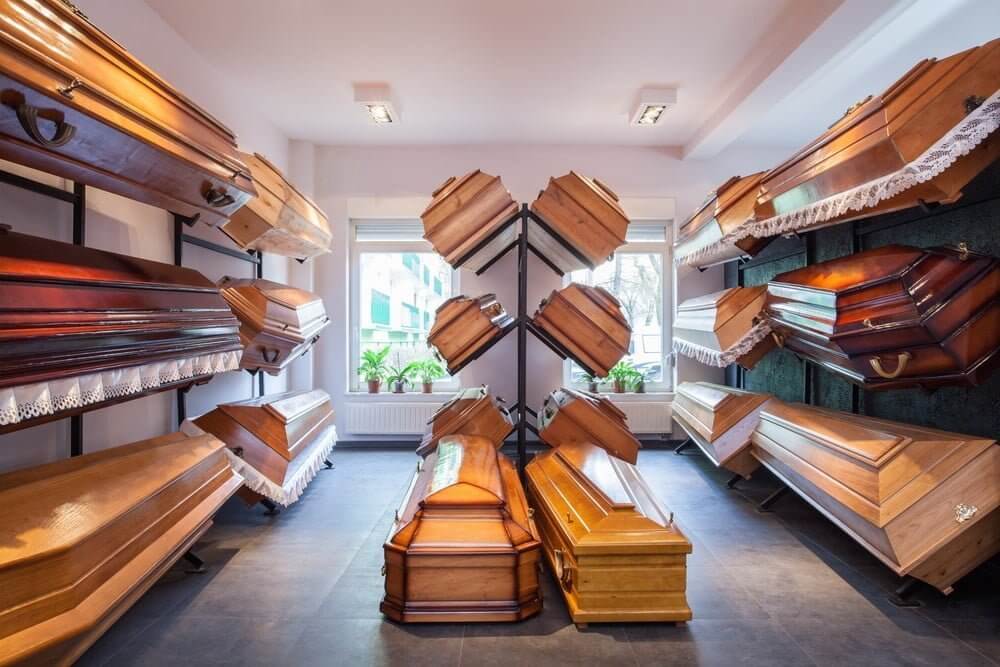
What Is The Funeral Rule?
Many people wonder whether or not they can buy their casket. The answer is yes!
According to the Funeral Rule from the Federal Trade Commission, funeral providers are legally obligated to use a casket purchased elsewhere with no additional fee.
In all 50 states, no laws say you must purchase a casket from the funeral home only after a person dies.
Buying A Casket Online
A great way to cut out the middleman, avoid the funeral home markup, and compare prices more efficiently is to purchase caskets or coffins at Walmart or Costco.
The best casket prices are often found online. However, while the price of their caskets may be low, the biggest thing to watch out for is shipping costs. For a metal casket, especially, shipping costs can be prohibitive, making it better to buy from a local funeral provider.
Choose kindness.
You never know what battles people may be fighting.
Dimensions of a Casket
Casket sizes vary between different styles and types. Traditional caskets often come in two main sizes: full-size and half-size.
Specialty caskets available with customized dimensions are also available for taller or oversized individuals. In addition to casket size, widths, heights, and shapes vary from one to the next.
Standard Sized Caskets
Standard-sized casket can vary greatly, depending on the type and size of the casket. Full-size caskets typically measure 84 inches in length, 24 inches in width, and 23 inches in height. Half-size caskets are usually shorter and narrower than full sizes, measuring 72 inches in length, 22 inches in width, and 21 inches in height.
Oversized Casket
There are oversized caskets for those who do not fit in a standard casket. Oversized caskets are larger than standard caskets and typically measure up to 96 inches in length, 30 inches in width, and 24 inches in height.
These caskets may also have extra features such as an extended foot-end or higher walls for added comfort.
Oversized caskets offer more space and accommodate those taller or larger than the average size. These caskets also provide extra room for mementos and other personal items to be placed inside.
How to Choose the Right Size of a Casket
When selecting a casket, it is important to choose the right size to ensure that your loved one is comfortably laid to rest.
To do this, measure the body length and width before selecting a casket. If you are unsure of the exact size or have special accommodations in mind, consider consulting with a funeral professional who can help you find the perfect size.
Additionally, consider any items you may want to place in the casket, such as mementos or keepsakes, which can help you determine what size will best accommodate them.
How Different Dimensions Impact Costs
The cost of a casket can vary greatly depending on its size and features. Standard-sized caskets tend to be more affordable than oversized or custom models, as these may require additional materials and labor for construction.
Furthermore, specialty caskets, such as those that offer extended foot-ends or higher walls, may come at an additional cost due to their unique features.
Keep in mind that this can impact the cost of burial vaults as well. Burial vaults come in various sizes to accommodate different caskets and burial types. The size chosen should correspond with the size of the casket, with larger vaults able to support heavier caskets and provide additional protection.d
Frequently Asked Questions
What is a coffin?
A coffin is a box-shaped container for a dead body. A coffin can be any shape or contain many decorative adornments. Historically, simple wooden boxes were used as coffins, but there is no set standard and the material and color of the coffin varies greatly. Some wooden coffins are lined with tin or lead so that they may serve more than one purpose – to carry the dead person’s physical form on its last journey while containing valuable items such as clothing and jewelry during their lifetime burial process. All sorts of materials have been used to construct coffins: woven straw, natural plant and animal reeds and fibers (saguaro cacti), metal (tin plated iron wire netting), bones
What is the difference between a coffin and a casket?
A coffin is a box that people are buried in. A casket is the thing you put the coffin into during burial to give it that extra “oomph” of class. Historically, coffins were often homemade because many people couldn’t afford one, so now the key difference between a coffin and a casket basically comes down to cost. The most expensive casket will usually be better quality and have nicer decoration– sometimes even being elaborately carved with designs or materials like wood or marble– so it holds up better against time and weathering. It’s also much prettier than just stacking someone’s corpse in an unpainted wooden box!
How can you rent a casket?
Renting a casket involves using the casket for the funeral service or viewing only. When the body is buried, a separate container will be used. In this way, you pay only a fraction of the cost of owning the casket, while still being able to display your loved one’s body in the manner that suits them.
Which is cheaper coffin or casket?
The cost of a coffin or casket varies widely depending on the materials used and the style chosen. Generally, coffin prices are lower than caskets because they are usually made from simpler materials such as wood or cardboard. Caskets can be more expensive since they may be made with more ornate materials such as metal, solid wood, or hardwood veneer. Caskets may also have additional features, such as a raised lid or detailed handles, that add to their cost. Ultimately, choosing between a coffin and a casket will depend largely on personal preference and budget.
Can you be buried without a coffin?
In most cases, a body must be buried in a coffin or casket. If a coffin is not available, other approved containers can sometimes be used to bury the deceased. Examples of alternatives include baskets, wicker containers, simple cardboard boxes, and even burial shroud made from natural materials such as linen or cotton. Depending on local laws and cemetery regulations, it may also be possible to bury the deceased without any container at all. It is important to check with your local authorities before making a decision in order to ensure that you are following the necessary rules and regulations. Additionally, many cemeteries will require an outer burial container regardless of what type of inner container is used.
What are the different size caskets?
Caskets are typically available in various sizes to accommodate different body types and weights. Common casket sizes include standard, queen, king, and extra-large. Standard exterior dimensions measure about 28 inches wide by 80 inches long and can be used for most adult bodies up to 6’3” tall. Queen-size caskets are slightly wider at approximately 30 inches and can hold a body up to 6’7” tall. King-size caskets measure 32 inches wide by 86 inches long, and extra-large caskets measure 34 inches wide and can accommodate a body up to 7 feet tall. It is important to select the appropriate size casket to ensure the body fits properly. Additionally, some cemeteries may have specific regulations regarding the type and casket dimensions that can be used on their grounds. It is important to check with your local cemetery before deciding to ensure compliance with all applicable rules and regulations.
What is the cheapest casket you can be buried in?
The cost of a casket or coffin will vary depending on the materials used and the style chosen. Generally, basic coffins and caskets constructed from simple materials such as wood or cardboard are the least expensive options. Depending on budget, it is also possible to find more elaborate styles made with higher quality materials for a more moderate price. Additionally, it is important to compare prices from multiple sources to get the best deal. Ultimately, the cheapest coffins or caskets depend largely on personal preference and budget. Therefore, it is important to take your time and carefully select before making a final decision.
What is the best casket to be buried in?
The best casket or coffin is the one that best meets your personal preferences and budget. Generally, higher quality materials such as metal, solid wood, and hardwood veneer will provide a longer-lasting burial container for the deceased. Additionally, features such as a raised lid or detailed handles can add an additional level of aesthetic detail to the casket. Ultimately, the best option will depend largely on individual preferences and budget. Therefore, it is important to compare prices from multiple sources before making a final decision. Additionally, some cemeteries may have specific regulations regarding the type and size of casket that can be used on their grounds, so it is important to check with your local cemetery before making a decision.
Is a casket bigger than a coffin?
Generally, caskets are slightly wider and longer than coffins. Standard-size caskets measure about 28 inches wide by 80 inches long, while standard dimensions of a coffin measure 26 inches wide by 79 inches long. Queen-size caskets are slightly wider at approximately 30 inches, while queen-size coffins measure 28 inches wide. King-size caskets measure 32 inches wide by 86 inches long, and king-size coffins measure 30 inches wide by 85 inches long. Extra-large caskets measure 34 inches wide, while extra-large coffins measure 32 inches wide.
Do they make extra large coffins?
Yes, extra-large coffins are available and typically measure 32 inches wide. Extra-large caskets measure 34 inches wide and can accommodate a body up to 7 feet tall. It is important to select the appropriate size casket or coffin in order to ensure that the body fits properly. Additionally, some cemeteries may have specific regulations regarding the type and size of casket that can be used on their grounds. It is important to check with your local cemetery before making a decision in order to ensure compliance with all applicable rules and regulations.
Conclusion
Now that you have a better understanding of what caskets are and how much they cost, it’s essential to take time to think about your final wishes.
It is up to each person and their family members or loved ones to decide which type of burial option, whether a traditional funeral or cremation, will best suit them during this difficult time in their life when planning for funeral arrangements following someone’s death.
We hope this article helped you better decide on this critical item.
Warm Regards,
The GetSure Team


